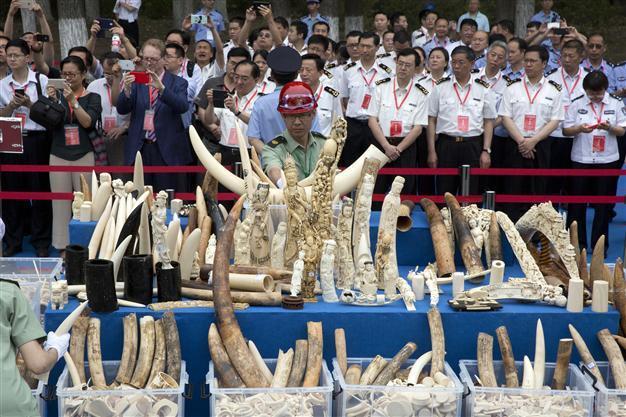China crushes half a tonne of ivory in symbolic gesture
BEIJING - Agence France-Presse

Chinese officials watch as workers prepare ivory products for destruction during a ceremony in Beijing, Friday, May 29, 2015. China's State Forestry Administration and General Administration of Customs officials presided over a ceremony to destroy more than 660 kilograms of ivory that was seized after being smuggled into the country, as part of a crackdown on the illegal trade. AP Photo
China destroyed more than six hundred kilograms of ivory in front of media and diplomats May 29, as it seeks to shed its image as a global trading hub for illegal elephant tusks.Engraved tusks and carved ivory chopsticks were fed into a crushing machine which spewed powder and clouds of dust into the air on the outskirts of Beijing.
Surging demand for ivory in Asia is behind an increasing death toll of African elephants, conservationists say, as authorities fail to control international smuggling networks.
Experts believe that most illegal ivory is sold in China - where products made from the material are seen as status symbols - with some estimating the country accounts for as much as 70 percent of global demand.
Beijing has made efforts to curb the trade, stepping up prosecutions of smugglers and seizures of ivory at border posts, but campaigners say the measures have not gone far enough.
Officials said 660 kilograms of ivory were crushed on May 29, as the machine gave off a loud crunching noise.
Larger items were sliced up by a circular saw and placed on a conveyor belt leading to the machine.
"We will strictly control ivory processing and trade until the commercial processing and sale of ivory and its products are eventually halted," Zhao Shucong, head of China's State Forestry Administration said at the event.
Diplomats from the United States, Britain and several African nations were watching, along with foreign media who were provided free food and transport.
The event followed China's first public destruction of ivory, reportedly weighing six tonnes, in the southern city of Dongguan last year.
A joint report in December from Save the Elephants and The Aspinall Foundation campaign groups found that more than 100,000 wild elephants were killed from 2010 to 2012, with the slaughter largely fuelled by the "out of control" illegal ivory trade in China.
Beijing is a signatory to the Convention on International Trade in Endangered Species (CITES), which in 2013 identified China as one of eight nations failing to do enough to tackle the illegal ivory trade.
China in February announced a one-year ban on imports of ivory carvings, but activists described the move as symbolic as legal imports are minor and most seizures of illegal items are of raw ivory.
















